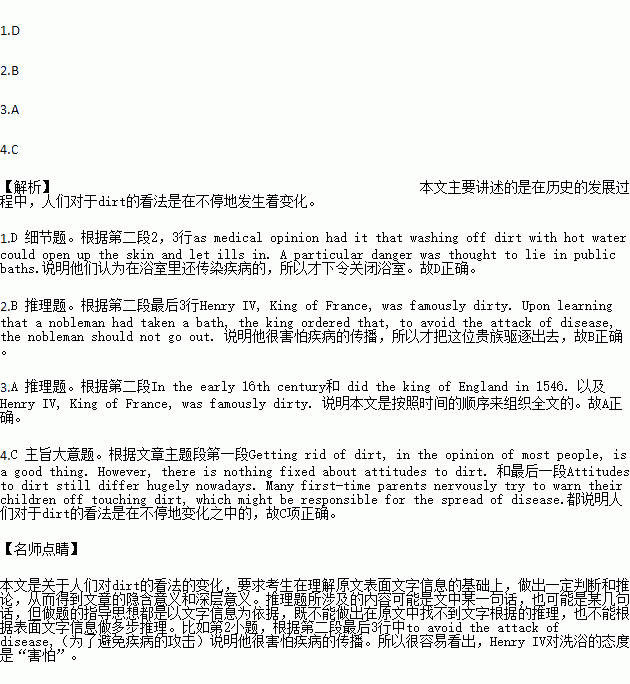题目内容
Getting rid of dirt, in the opinion of most people, is a good thing However, there is nothing fixed about attitudes to dirt.
In the early 16th century, people thought that dirt on the skin was a means to block out disease, as medical opinion had it that washing off dirt with hot water could open up the skin and let ills in. A particular danger was thought to lie in public baths. By 1538, the French king had closed the bath houses in his kingdom. So did the king of England in 1546. Thus began a long time when the rich and the poor in Europe lived with dirt in a friendly way. Henry IV, king of France, was famously dirty. Upon learning that a nobleman had taken a bath, the king ordered that, to avoid the attack of disease, the nobleman should not go out.
Though the belief in the merit(优点) of dirt was long-lived, dirt has no longer been regarded as a nice neighbor ever since the 18th century. Scientifically speaking, cleaning away dirt is good to health. Clean water supply and hand washing are practical means of preventing disease. Yet, it seems that standards of cleanliness have moved beyond science since World War II. Advertisements repeatedly sell the idea: clothes need to be whiter than white, cloths ever softer, surfaces to shine. Has the hate for dirt, however, gone too far?
Attitudes to dirt still differ hugely nowadays. Many first-time parents nervously try to warn their children off touching dirt, which might be responsible for the spread of disease. On the contrary, Mary Ruebush, an American immunologist(免疫学家), encourages children to play in the dirt to build up a strong immune system. And the latter position is gaining some ground.
1.The kings of France and England in the 16th century closed bath houses because .
A. they lived healthily in a dirty environment
B. they thought bath houses were too dirty to stay in
C. they considered bathing as cause of skin disease
D. They believed disease could be spread in public baths
2.Which of the following best describes Henry IV’s attitude to bathing?
A. Curious B. Afraid C. Approving D. Uninterested
3.How does the passage mainly develop?
A. By following the order of time. B. By making comparison.
C. By providing examples D. By following the order of importance.
4.What is the author’s purpose in writing the passages?
A. To call attention to the danger of dirt.
B. To introduce the history of dirt.
C. To present the change of views on dirt.
D. To stress the role of dirt.
 阅读快车系列答案
阅读快车系列答案假设最近某校就同学们的习惯养成问题展开了讨论。请你根据下表所提示的信息,用英语写一篇题为A good habit, a successful life 的短文,发表在该校的网站上。
良好的学习习惯 | 1. 上课注意力集中 2. 充分利用课外时间 3. 按时完成作业… |
良好的生活习惯 | 1. 健康的饮食 2. 规律的运动 3. 充足的睡眠… |
养成良好的习惯的好处 | 好习惯对生活有积极地影响 2.… 3.… (请考生结合自身感受补充两点) |
注意:1. 开头已给出。
2. 可适当增加细节,以使行文连贯。
3. 词数100-120。
形成良好的习惯:develop good habits of…
利用:make use of
A Good Habit, a Successful Life
A habit is something that you do often or regularly almost without thinking, especially something that is hard to stop doing.

